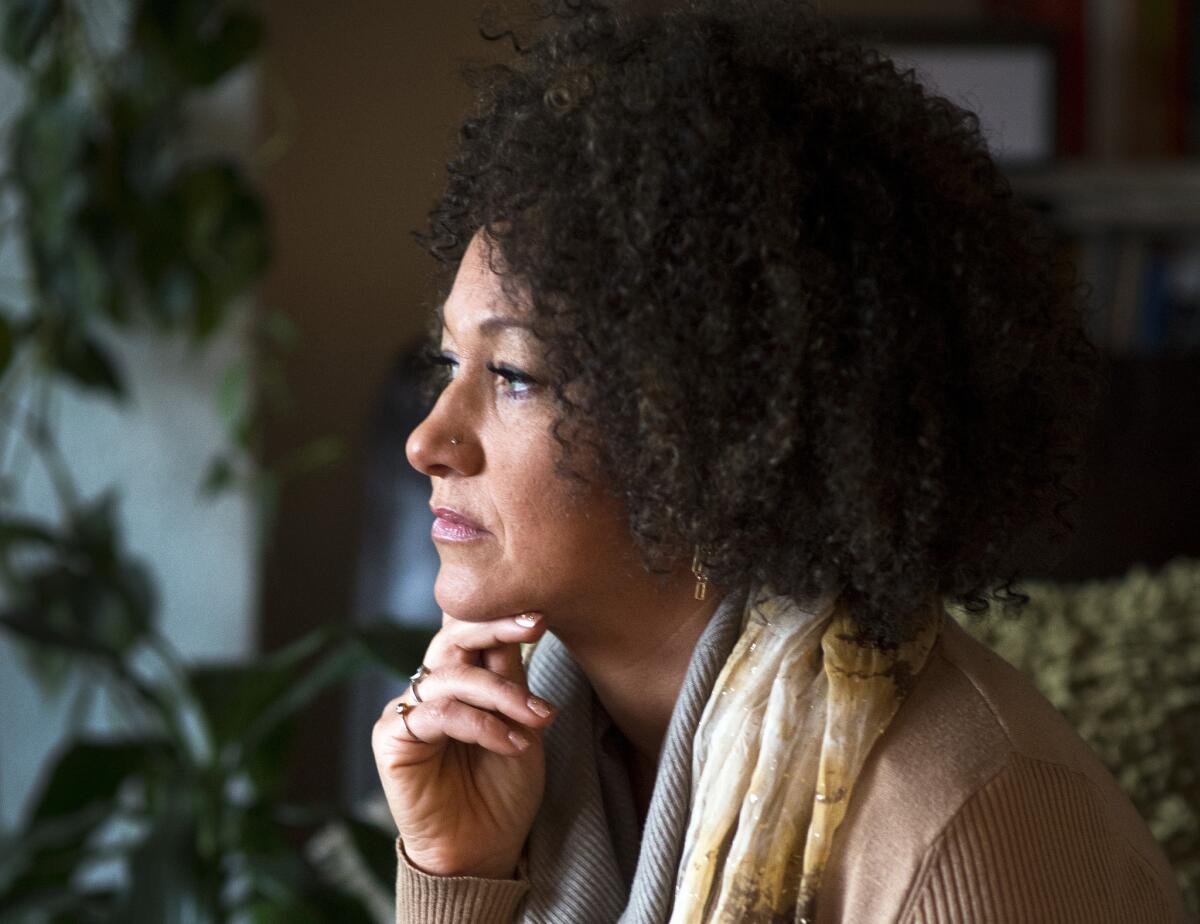Op-Ed: Why Rachel Dolezal would want to pass as a black woman

Rachel Dolezal, who had claimed she was black, has resigned as president of the Spokane, Wash., chapter of the NAACP.
- Share via
It’s hard to think of a more bizarre story, or one more representative of contemporary America, than that of Rachel Dolezal. Dolezal is an academic and activist who represented herself as African American for many years, earning a degree in Africana studies, even ascending to the position of president of the Spokane, Wash., chapter of the NAACP.
Dolezal’s parents, however, have recently made matters uncomfortable for her, telling the media that she is in fact Caucasian and showing photos of her as a younger woman with blond hair and blue eyes. The NAACP is standing behind Dolezal, stressing that “racial identity is not a qualifying criteria or disqualifying criteria for NAACP leadership.” But there are additional questions regarding, among other things, her position on a local police council. When applying to the Spokane police ombudsman commission, she indicated a racial category of black, which if untrue would violate the city ethics code.
Dolezal, for her part, acknowledged that her biological parents are two self-identified Caucasians, but has thus far refused to elaborate.
The story has predictably been catnip to our pundit class, provoking commentary ranging from the outraged to the sympathetic to the amused. Almost everyone, however, has been shocked — shocked that someone would act this way and shocked that someone could pull it off. I am shocked that people are shocked. Rachel Dolezal was inevitable. We made her.
Human behaviors are the product of incentives. We repeat behaviors that are rewarded. And clearly, Dolezal believed she would find rewards in representing herself as a black woman. That statement might seem strange, given the continuing destructive power of racism in America. In material terms, the condition of the average black American has actually gotten worse in the last 35 years, post-racial rhetoric to the contrary. Racism and white supremacy are real and powerful in America in 2015.
Why, then, would someone try to occupy that position of oppression? The answer has a lot to do with the spaces that Dolezal had advanced in: political activism and academia.
It happens that I’ve spent most of my life in those spaces. And in those spaces, a set of social norms have created direct incentives for Dolezal’s behavior — and forbidden anyone from checking up on her story.
First, there is a series of dubious and problematic presumptions made about black people that, while ultimately unhealthy, might have appeared attractive to Dolezal. The notion of black people generally and black women specifically as inherently more authentic, more wise, or more connected to nature are alive and well in many academic and activist contexts.
Though many race theorists have convincingly argued that such stereotypes are actually connected to the most noxious attitudes about race, and ultimately perpetuate racial inequality rather than combat it, for an individual white person working in those spaces, blackness might appear to be the kind of thing you might want to borrow — particularly given that you wouldn’t have experienced a lifetime of petty bigotry and major discrimination. Indeed, part of what makes this story so offensive to many lies in the fact that Dolezal has borrowed a racial identity without suffering from the harsh consequences of American racism.
She might not have attempted such a deception if not for another aspect of academic and activist culture: the notion that race does not equate to skin color, complexion or other physiological markers. I have attended many academic conferences where speakers have passionately argued against the notion of someone “looking black,” that you can ever tell by looking at someone what their racial identity might be.
I have no opinion on this issue; it’s not my question to answer. But with that kind of social taboo in place, there was little to fear for Dolezal in representing herself as black; only the belated attention of her parents brought the truth to light. Nor did she have to worry that anyone would dig into her claims that she’d received hate mail and was the victim of hate crimes — which are also now in doubt.
Who, exactly, would feel confident in questioning the claims of a self-identified victim of a hate crime? Particularly when that person was serving as the head of a regional NAACP branch? The outraged tweets write themselves. Dolezal was no dummy. She knew how these cultures operate. She knew she was protected.
In the end, perhaps Dolezal simply believed the convictions of her academic culture a little too much. After all, we on the left have insisted for years that the various demographic categories we are placed into are merely social constructs, the creation of human assumption and human prejudice. That race is a social construct is a stance that brooks no disagreement in left-wing spaces.
It should not surprise us, then, when an individual chooses to create a different racial identity for herself. I’m not saying that’s a legitimate reading of social construct arguments. I’m not saying I condone her behavior; like most people, I find it offensive. I’m simply saying that this behavior is inevitable given the current social and linguistic codes of the worlds in which Dolezal lives. We created those incentives and so we’ve created this behavior.
Fredrik deBoer is a writer and academic. He lives in Indiana.
Follow the Opinion section on Twitter @latimesopinion and Facebook
More to Read
A cure for the common opinion
Get thought-provoking perspectives with our weekly newsletter.
You may occasionally receive promotional content from the Los Angeles Times.









